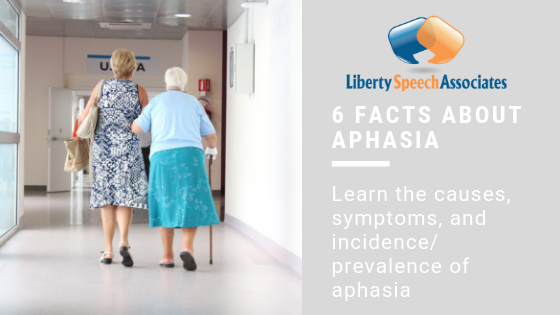Do you know the word “aphasia?” Most people don’t. In fact, more than 80% of people who completed the 2016 National Aphasia Awareness Survey never heard the word “aphasia.” The purpose of this video/blog post is to help spread awareness on aphasia by sharing 6 important facts about this invisible disorder.
Fact 1: Aphasia is a communication disorder
Aphasia affects a person’s ability to speak, read, write, and/or understand words. It affects everyone differently.
Fact 2: Aphasia does not affect intelligence
Because aphasia impacts a person’s ability to understand and formulate words and sentences, it is often wrongly assumed that the person has a form of intellectual disability. However, this is not the case. A person with aphasia can still think and generate ideas as s/he did before. But s/he may struggle to express those thoughts and ideas in words.
Fact 3: Aphasia can happen to anyone
Aphasia can occur at any age, but is most commonly seen in adults. It used to be thought of as an old person’s condition. However, there are adults in their early 20s (and individuals even younger) who have aphasia. There are at least 2 million people in the USA who have aphasia. In fact, there are more people with aphasia than there are with many well-known conditions. For example, more people have aphasia than have Parkinson’s Disease or multiple sclerosis.
Fact 4: Aphasia is commonly caused by stroke or brain injury
Approximately 1/3 of strokes result in aphasia.
Fact 5: Aphasia and stroke can occur at any time
Because they can happen at any time, it’s important know the warning signs. A common phrase used to help people remember stroke signs is “Act FAST.” F is for face – individuals who suffer a stroke typically suffer facial drooping. A is for arm – people who are having a stroke demonstrate arm weakness. S is for speech – slurred speech is a common symptom of stroke. T is for time – Although time is not a sign or symptom of aphasia or stroke, the T is to remind us that the sooner someone receives medical treatment when experiencing stroke symptoms, the better the outcomes can be. For more information on stroke, read this Stroke 101 post.
Fact 6: There is currently no “cure” for aphasia
There is currently no pill or medical treatment that can cure/completely reverse the effects of aphasia. However, most people with aphasia can make progress over time even several years after onset. There are numerous resources available for people with aphasia and their caregivers to assist with recovery.
Please share this video or blog post to help us spread the word about aphasia!

